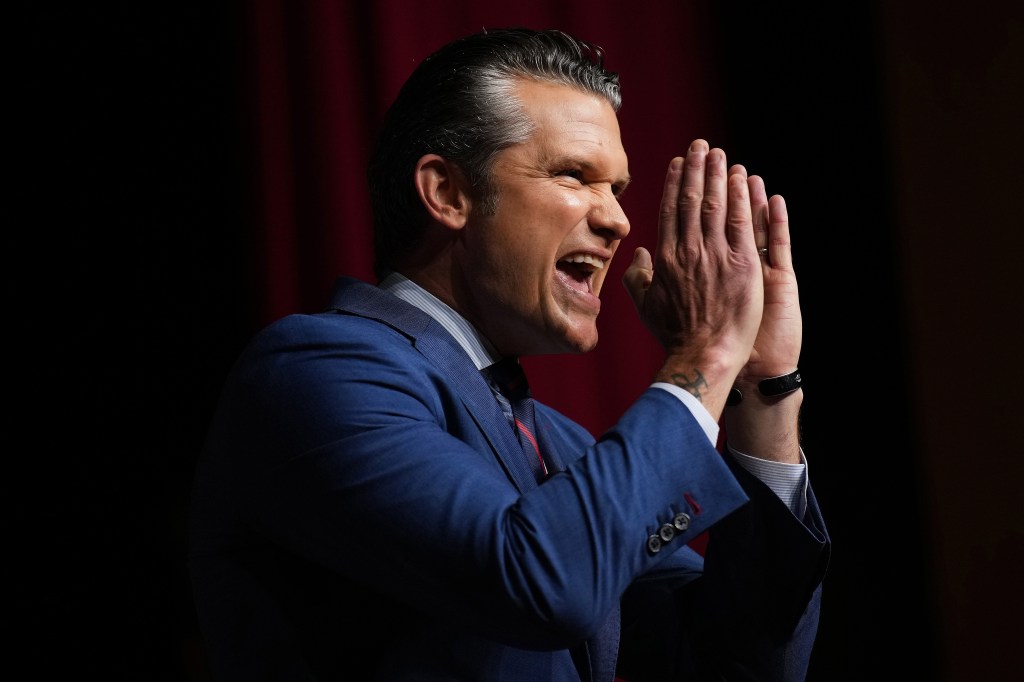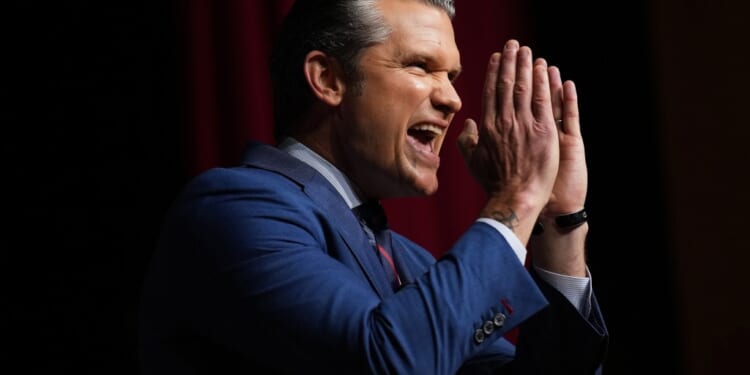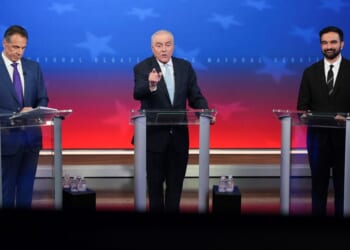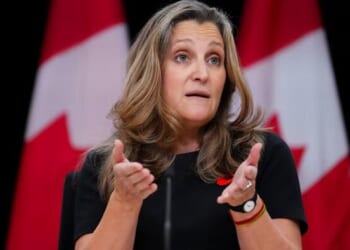
It had the feel of Pop Warner players scolding a group of NFL linebackers about the importance of hustle. If you weren’t paying close attention, you might even have missed the menacing parts.
Cringe.
In a world where Robert F. Kennedy Jr. didn’t exist, Hegseth would be the most embarrassing member of the administration.
Rather than pay his deputies the respect of addressing them in a professional way, he appeared onstage before a comically enormous American flag and strode around performatively while speaking. It was what you’d expect at a Turning Point USA event or an infomercial (he plugged his own book at one point), not a major military summit. And that stands to reason: One of the two qualities that landed him this job was his talent as a host on Fox News, where the toughest thing he had to do was maintain his poise on camera after taking a shot to the balls.
He’s a performer, not a strategist. Today was plainly his way of fulfilling his fantasy of delivering a performance like the one George C. Scott delivered in the famous opening of Patton.
I suspect his insecurity about being out of his depth partly explains his obsession with toughness. Hegseth is a decorated veteran, but he now commands thousands of men with far more military and policy experience than him, none of whom are primarily known for being a talk-show host. He’s too smart not to grasp that he’s ended up where he has only because the president can’t distinguish right-wing television from reality. As such, his recurring resort to talking points about “lethality” and “warriors” reeks of overcompensation, as if he thinks he might earn the respect of his underlings by impressing them with sheer militaristic bravado.
Which, ironically, probably makes him seem to them like even more of a poseur.
He used his face time with his officers today, which required many to travel thousands of miles to attend in person, to issue important reminders that soldiers shouldn’t be fat, shouldn’t wear dresses, and shouldn’t worry about climate change or support diversity initiatives. At one point he stared at the camera and said with a self-congratulatory smirk, “To our enemies: F-A-F-O,” which instantly became either the most embarrassing televised moment of the second Trump presidency to date or the second-most embarrassing. It’s the sort of juvenile taunt to which you would stoop if you were a made-for-media right-wing blowhard who approaches global conflicts as if they’re schoolyard fights. Go figure.
But as I say, every menacing Trump stunt comes with some cringe and every cringy Trump stunt comes with some menace. Hegseth delivered on the menace.
The second quality that appears to have convinced the president that he was defense-secretary material is Hegseth’s apparent belief that morality, at least in war, is for suckers. To hear him talk, you would think there’s nothing wrong with the U.S. military that can’t be fixed by having it behave more like the Russian military. He lobbied Trump during his first term on behalf of troops accused of war crimes and, as recently as last week, made a point of announcing that the soldiers who massacred Native Americans in 1890 at Wounded Knee won’t be stripped of the Medals of Honor they received.
He’s a perfect choice for Trump’s Cabinet and for American populism more generally insofar as he seems to believe that greater ruthlessness, not intellect, is the solution to all problems. “No more politically correct, overbearing rules of engagement,” he promised the generals during this morning’s speech, which, in light of his history, sounded like he was giving them the green light to practice the Russian way of war by targeting civilians. For good measure, he also vowed to overhaul the Pentagon’s Office of the Inspector General—the same one that’s investigating him, incidentally—which should further reduce internal scrutiny of corruption.
It’s hard to imagine any soldier in Pete Hegseth’s military being disciplined for wanton murder in the field or any officer who’s demonstrated support for the president being disciplined for anything else. We might call that Putinization. Or, given the secretary’s servile authoritarianism, contempt for legal restraints on force, paranoia about the free press, and performative machismo, we might call it something else.
Speaking of which, the president also spoke this morning.
Menace.
Trump’s speech was cringy in classically Trumpy ways. He rambled for more than an hour. He hopped from topic to topic, digressing about everything from the “Gulf of America” to the proto-wokeness of changing the name of the Department of War to “Defense” in 1949 to other subjects that weren’t entirely coherent. He looked and sounded exhausted and slurred some of his words.
He was greeted by silence instead of sycophantic cheers as he walked onstage. When I say that America isn’t yet a third-world country, that’s what I mean.
The difference between the president and his defense secretary is that Trump had a strategic point to make. (One that was more complex than “F-A-F-O,” anyway.) He wanted his officers to understand that their duties will oblige them to make war on American citizens, not just on foreigners, in certain circumstances.
“We’re under invasion from within,” he told them, remembering that several of his illustrious predecessors had deployed troops on U.S. soil. “No different than a foreign enemy, but more difficult in many ways because they don’t wear uniforms.”
“Last month, I signed an executive order to provide training for a quick reaction force that can help quell civil disturbances,” he said elsewhere. “This is gonna be a big thing for the people in this room, because it’s the enemy from within and we have to handle it before it gets out of control.”
He was clear about who’s to blame. “The [cities] that are run by the radical left Democrats—what they’ve done to San Francisco, Chicago, New York, Los Angeles. They’re very unsafe places and we’re gonna straighten them out one by one,” the president said. “And this is gonna be a major part for some of the people in this room. That’s a war too. It’s a war from within.”
At another point he criticized the Biden administration for not authorizing military pay raises. “They did not treat you with respect,” Trump warned. “They’re Democrats. They never do.”
He didn’t demand a loyalty pledge from them, as some doomsayers feared might happen at this event. What he did, essentially, was make a case that they should pledge that loyalty without being asked. If the other party doesn’t respect the military, if it’s churning out the equivalent of enemy combatants in parts of the country that it governs, why wouldn’t the officer corps align itself forthrightly with Republicans?
He also reminded them, and us, this morning that he’s getting more insistent about reconceptualizing crime as “war,” having used the same word a few days ago to describe the supposed state of play in Portland. Doing so scratches the fascist itch to frame all social problems as emergencies that entitle the executive to extraordinary powers. It encourages the military to take sides, as soldiers by definition can’t be neutral in matters of war. And it potentially justifies the troops’ use of what the president delicately described in his statement about Portland as “Full Force” in trying to win.
Even the most hawkish of traditional hawks have begun to squirm about all this. “There has to be a line between crime and war,” John Yoo, author of the so-called “Torture Memos” during the Bush administration, said recently to Politico of Trump targeting supposed seaborne drug traffickers. “We can’t just consider anything that harms the country to be a matter for the military. Because that could potentially include every crime.”
Can’t we? Anything that harms the country is potentially a matter for the military is a nice précis of authoritarian logic, actually. The military is the most lethal force in the country, it’s under the president’s direct command, and Americans broadly accept that it should have more leeway to kill than civilian law enforcement forces have. Under Pete Hegseth, that leeway is now functionally absolute. Corralling the army into acting as muscle in its persecution campaign against its enemies is basically the political endgame for postliberalism.
Besides, it’s not like American troops will have anything else to do.
Strategy.
A few weeks ago Hegseth was asked about Russia’s recent incursions into Polish airspace. “We’ve projected power for a long time in far-flung places that had a nebulous connection to our own security in the homeland,” he replied. “We’re securing the homeland.”
Some hawks heard an uncomfortable historical echo in those comments, but Hegseth wasn’t just spitballing. The new National Defense Strategy he’s preparing follows through on those priorities, the Washington Post reports, “centering the Pentagon on perceived threats to the homeland, narrowing U.S. competition with China, and downplaying America’s role in Europe and Africa.” Joint Chiefs chairman Gen. Dan Caine is allegedly one of several top officials concerned that his boss and the White House appear poised to retreat from great-power competition with China and to diminish the military’s ability to respond to crises around the world.
Two days before that news broke, a separate story appeared in the Wall Street Journal about Chinese supremo Xi Jinping pursuing some sort of grand bargain with Trump in which the U.S. would formally shift from “not supporting” Taiwan’s independence to actively “opposing” it. That sounds like a minor rhetorical shift, but it isn’t. “Driving a wedge between Washington and Taipei is the holy grail of the Taiwan problem for Beijing,” one expert told the paper. The semantic change being sought would “undermine Taiwan’s confidence and increase Beijing’s leverage over Taipei.”
Wasn’t it obvious from the start that things were headed this way?
The American right of 2025 has no deep ideological objection to Chinese totalitarianism like the American right of 1985 had to Soviet communism. Nationalists’ core grievance against China has to do with the offshoring of manufacturing jobs; if Xi can figure out a way to satisfy Trump on that point, such as by pledging to have Chinese companies open plants in the U.S., I expect he’ll get his grand bargain. “America First” doesn’t care about Taiwan. It’s right there in the name.
The thought of beating the Chinese doesn’t get postliberals out of bed in the morning. What puts a spring in their step is the prospect of dominating their internal enemies. Nationalism, as I’ve said before, is a politics of tribalism that seeks to establish the hegemony of one’s own tribe over domestic rivals. It doesn’t worry much about foreign tribes in “far-flung places” until the ones closer to home have been subdued.
That’s why nationalists prefer a foreign policy based on “spheres of influence” to one based on international law. They’d rather have a global order in which major powers like the U.S. and China get to persecute their domestic opponents and threaten local tribes in their near-abroad to one in which major powers are limited by norms and treaties in their ability to bully disfavored weaklings.
The remarks this morning by Trump and Hegseth were of a piece with that. In different ways, the president and his defense secretary lobbied the country’s top military officers to overcome the moral squeamishness toward nationalist priorities that 80 years of the American-led rules-based international order have bred into them.
Trump wants the military to treat certain American tribes as enemies the same way it does foreign powers, starting with the Democratic Party that shields and encourages criminals. Hegseth wants the military to regard ruthless brutality toward America’s enemies as a virtue, unbothered by the Geneva Conventions and other attempts to make war slightly less inhumane than it needs to be.
They’re asking military officers to relinquish their qualms about using “full force” against their own countrymen. Trumpism abhors self-discipline of any kind, moral or otherwise; its new leaders want the U.S. military to be less disciplined.
That’s a little different from what George C. Scott asked of his men at the start of Patton, but the country that produced Gen. Patton isn’t the same country that produced Donald Trump and Pete Hegseth. I wonder how many officers in the audience had a hard reckoning with that fact this morning.

















